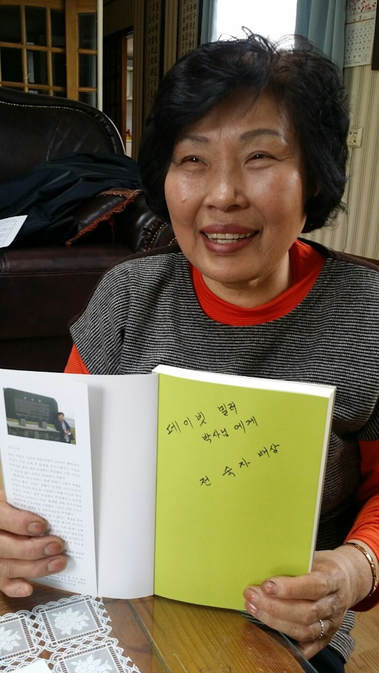|
Below is an initial translation of Jeon Suk Ja's poem "A Red Belt"one of many that will be performed for the first time in the UK after the showing of the film "The Longest Tomb" at SOAS on 29th May. Please also see the press release underneath for more details......
A Red Belt Koreans from Busan To Pyongyang should listen To klaxons from Dorosan station Announcing new routes spanning North and South and also to Europe as in times past But someone placed a red belt here. Why apply so much pressure With no thought to release? It’s been fifty years since families were separated Fifty years since those events Now there is only death on the horizon I try to surmount these difficulties But my Father’s passing Encumbers O where is the release from This red belt? There is a small village in the North That seems closer than ever Mountain ranges hold their hands together Hundreds of peaks, even Yeonmi Mountain Look like family to me But the route is blocked Only the clouds are free to pass The red belt. Jeon Suk Ja FOR IMMEDIATE RELEASE THE LONGEST TOMB, UK Premiere of a Korean Language Documentary on the Daejeon Massacre (1950) Knowledge is Power and The Education Centre for Peace and Reunification present The Longest Tomb, the first ever documentary on the controversial subject of mass killings in Daejeon, South Korea during the Korean War. This subtitled English language premiere of the film will take place at SOAS’ Alumni Lecture Theatre, Senate House in London at 7pm on 29th May 2018. Starting with a chance to meet the production team, followed by a screening of the film itself, the night will end with survivor testimonies from Ms. Jeon and Mr. Lee who will travel from Daejeon to promote it. There will also be readings from Ms. Jeon’s recent book of poetry on the same subject and time for Q&A. The Daejeon Massacre is a little known tragedy from the Korean War, the truth of which has been buried for political reasons by almost 40 years of dictatorship and another 30 years of public silence. Now entering a period of openness following the South Korean President’s appearance at the 4.3 Memorial Day on Jeju Island, the hope of the film is to finally come to a public consensus over the truth of these events. This includes addressing questions over casualties (a figure ranging from 1,800 to 7,000) but also the real human cost and political ramifications for the Korean peninsula as a whole. Knowledge is Power is an internet podcast show that covers local politics in the Daejeon area. Set up by Mr. Chinho Jung in 2017, it is a non-profit organization that aims to provide a space for the empowerment of Daejeon citizens. The Education Center for Peace and Unification is a cultural center in Daejeon promoting peace and reunification. They offer education on topics such as ‘division and unification’ and ‘inter-Korean relations’. Mr. Jaegeun Im, an instructor, is the film’s narrator. To learn more please contact Dr. David Miller on davidrmiller@hotmail.co.uk ### |
Categories
All
Archives
April 2023
|

 RSS Feed
RSS Feed
